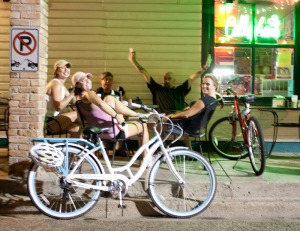Last week, Sen. Jeff Sessions (R-AL) told Streetsblog freelancer Alice Ollstein that he had good reason to oppose Transportation Enhancements, the program that funds bicycle and pedestrian facilities.

“I just saw that in my hometown, they stopped construction of a highway because the federal government insisted on bike paths,” Sessions said. “It’s going to delay for over a year and add 10 percent to costs. So I’m very dubious about the mandates of that kind. A lot of the things we’ve been spending money on have not shown themselves to be ‘enhancements.’”
As it happens, Niklas Hallberg of Alabama bicycle blog Southern Spokes sent us the details about this supposed "highway" with bike paths. We’d like to point out five facts that Senator Sessions neglected to mention:
- Turns out this “highway” was a local road in Mobile, Zeigler Boulevard, that connects several neighborhoods with a city park and several schools. Local engineers say the road is “ideal” for bike lanes.
- It’s a minor detail, but just for the record, the project is a road widening, not new construction.
- Let's be clear about what caused this delay: The city wanted to the feds to pick up 80 percent of the tab for the project but flaunted a federal mandate to consider – that’s right, just consider – bicycle access.
- Maybe Sessions knows something the local paper doesn’t, but at the time this article was written (10 days ago) in the Press-Register, it was unclear how long the project would be delayed for the city to go back and redo the plan. But perhaps more importantly, the plans for this road widening have been on the books for about a decade already, so it’s not like this is the first delay it’s faced.
- Sessions used the Zeigler Boulevard example to explain why he’s opposed to Transportation Enhancements. It’s true that there are certain, very small pots of money that can only be used for their intended purpose, and that purpose is non-motorized transportation. But that’s not the federal mandate that slipped things up in Mobile. That was a rule that bicycles be considered and, if possible, accommodated, on roadways built with federal dollars. Maybe Sessions opposes all elements of federal support for healthy transportation options, but he should at least learn to tell them apart.
Cycling is growing in Mobile, but it’s got a long way to go. It ranks 228th out of 244 cities for bicycle mode share, with just 0.1 percent of its residents regularly bike-commuting. (That’s 42 residents, give or take.) If the city wants to "catch up to the rest of the country" when it comes to multi-modal transportation, as Niklas of Southern Spokes says he'd like, they're going to have to start at least complying with the bare minimum requirements for bicycle access.





